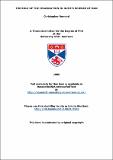The role of the imagination in Hume's science of man
Abstract
In recent years there has been an explosion of writing on
David Hume. His scepticism, his writings on morality, politics,
and religion, have all received substantial attention. What I
attempt to do in this thesis is to suggest that his
revolutionary contributions in all these fields can be better
understood if we consider his attempt to found the sciences on
the imagination.
What little work there is on the imagination in Hume's
writings is almost all concerned with Book I of the Treatise.
As regards Book I, I suggest that Hume's overarching problem is
to argue that belief is dependent on the imagination, whilst
still keeping a contrast with the whims of the 'fancy'. He
wants to disabuse us of the idea that we believe on account of
reason; but he wants to distinguish the claims of science from
the claims of poets.
But I also examine why he thinks his explanation of the
production of passions support his conclusions about belief.
And I argue that his former account guides conclusions found in
other genres. So for example, I examine certain essays and
letters about politics, and his explanation of religious events
in the History of England.
Why do men falsely believe that they are distinguished from
the animals through possessing reason? On the one hand Hume
tries to explain the origin of the sciences; on the other hand,
he tries to show how men have come to have a false conception
of themselves. A central aim of the thesis is to bring out
these themes through showing the use Hume makes of principles
of the imagination. I pay special attention to Hume's attempt
to argue that Christianity plays a major role in the sustaining
of the false view.
Type
Thesis, PhD Doctor of Philosophy
Collections
Items in the St Andrews Research Repository are protected by copyright, with all rights reserved, unless otherwise indicated.

